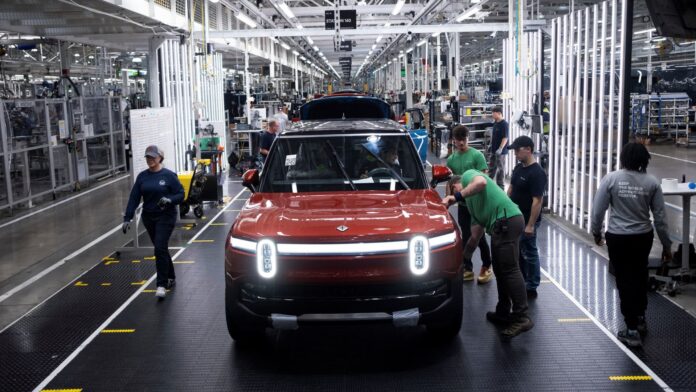Workers assemble second-generation R1 vehicles at electric automaker Rivian’s manufacturing facility in Normal, Illinois, on June 21, 2024.
Joel Angel Juarez | Reuters
Rivian Automotive beat Wall Street’s expectations for the first quarter and confirmed its 2025 earnings targets, but negatively adjusted its 2025 targets for vehicle deliveries and capital spending amid President Donald Trump‘s tariffs.
The all-electric vehicle manufacturer said it is “is not immune to the impacts of the global trade and economic environment,” despite producing all of its trucks and SUVs in the U.S. at a factory in Illinois.
“The current global economic landscape presents significant uncertainty, particularly regarding evolving trade regulation, policies, tariffs, and the overall impact these items may have on consumer sentiment and demand,” the company said Tuesday in its quarterly letter to shareholders.
Rivian’s new guidance includes deliveries of between 40,000 units and 46,000 units, down from a range of 46,000 units to 51,000 units, and capital expenditures of between $1.8 billion and $1.9 billion, up from previous guidance of between $1.6 billion and $1.7 billion.
Rivian reconfirmed plans to achieve a “modest positive gross profit” this year, as well as $1.7 billion to $1.9 billion in losses on an adjusted basis before interest, taxes, depreciation and amortization after its first-quarter results topped Wall Street’s expectations.
Here’s how the company performed in the first quarter, compared with average estimates compiled by LSEG:
- Loss per share: 41 cents vs. a loss of 76 cents expected
- Revenue: $1.24 billion vs. $1.01 billion expected
Notably, the automaker achieved its second consecutive quarter of gross profit during the first quarter — unlocking an expected $1 billion from Volkswagen Group as part of its investment in Rivian following the formation of their joint venture — Rivian and VW Group Technology LLC.
Rivian recorded a gross profit, which includes production and sales but does not factor in other expenses, of $206 million during the first quarter. That compares with $170 million during the fourth quarter.

Rivian, Lucid and Tesla stocks
The joint venture was announced last year as part of a $5.8 billion deal that includes funding for Rivian and VW utilizing the EV maker’s software and electrical architecture.
Rivian said it ended the first quarter with $8.5 billion in liquidity, including $7.2 billion in cash, cash equivalents and short-term investments.
The company’s first-quarter results were assisted by an increase in sales of automotive regulatory credits of $157 million, as well as an increase in software and services revenues of $318 million compared with $88 million a year earlier.
On an unadjusted net basis, Rivian narrowed its losses to $541 million during the first quarter. That compares to roughly $1.5 billion a year earlier and $743 million during the fourth quarter.
Rivian’s results compare to EV rival Lucid Group, which reported mixed first-quarter results Tuesday, while reconfirming its 2025 production guidance of roughly 20,000 vehicles and capital expenditures of $1.4 billion.
Lucid reported a loss of 20 cents per share vs. an expected loss of 23 cents, according to LSEG estimates, and revenue of $235 million vs. an expected $249 million.
